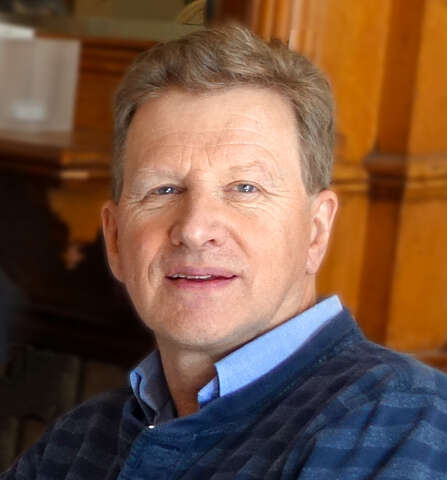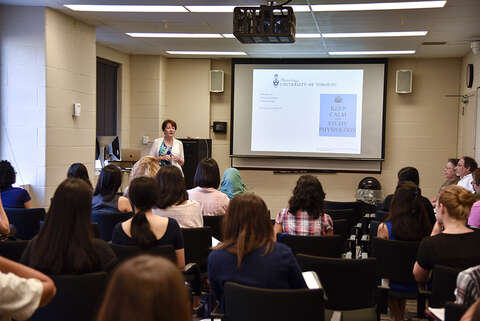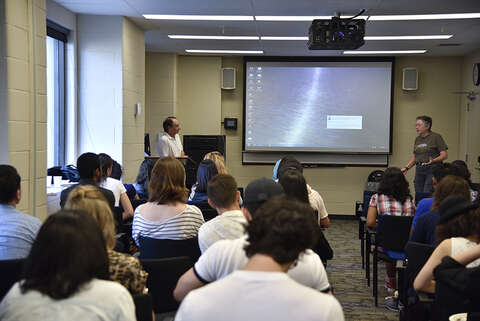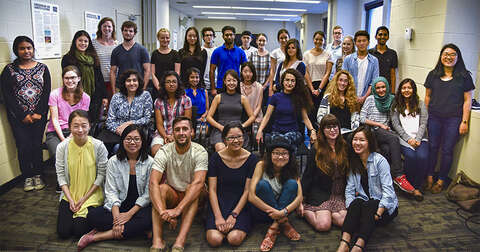Breadcrumbs
September 11, 2015
IN THIS ISSUE:
- Message from the New Chair
- Honours & Awards
- Physiology Seminar Series
- Graduate Student Orientation
- News from GASP
- Summer Training Activities
- New Cross-Appointee (Dr. Padmaja Subbarao)
- New Graduate Courses Offered
- Faculty In The News
MESSAGE FROM THE NEW CHAIR

I hope everyone had a great summer. I am delighted to welcome all faculty, staff and trainees to the new academic year. This is my first PhysioLINK as Chair of the Department of Physiology. It is a great privilege to lead one of the most successful Physiology Departments in the world. I look forward to meeting everyone in the coming weeks, and to working with you during my term as Chair.
I would like to take this opportunity to thank Dr. Denise Belsham for serving as Acting Chair during the last four months while my work permit was being processed. Denise’s leadership, dedication and enthusiasm are greatly appreciated.
This September, 40 new graduate students (PhD, MSc) joined the Department. There was a very successful new student orientation held earlier this month. This was a great opportunity to meet all of our new students and I would like to thank all of those involved in the event, and welcome all of our new students to the Department.
Best regards,
Graham L. Collingridge, FRS, FMedSci, FRSB, FBPhS
Ernest B. and Leonard B. Smith Chair
Department of Physiology
HONOURS AND AWARDS
Congratulations to Dr. Amira Klip on the following honours that she will receive in the near future:
- An Honorary Doctorate from the University of Copenhagen. November 20, 2015 (Copenhagen, Denmark)
- The Walter B. Cannon Award (Recipient addresses Cannon's concepts of "The Wisdom of the Body") by the American Physiological Society, April 2, 2016 (EB Meeting, San Diego, CA)
Congratulations to Wenbin (Bill) Liang, a former Ph.D student in our Department (Dr. Peter Backx’s lab, 2006-2011), who has accepted a position as an Assistant Professor at University of Ottawa this Fall.
PHYSIOLOGY SEMINAR SERIES
~ Eligible for PSL1000H/PSL2000H Course Seminar Attendance ~
Speaker: Kinya Otsu, MD, PhD
Institution: Professor and British Heart Foundation (BHF), Chair of Cardiology, Cardiovascular Division, King’s College London
Title: “Mitochondrial quality control, sterile inflammation and heart failure”
Date: Thursday, September 17th, 2015
Time: 4 p.m.
Location: Medical Sciences Building, University of Toronto, Room 2172
Host: Cardiovascular & Respiratory Platform
GRADUATE STUDENT ORIENTATION DAY
The Department of Physiology was delighted to welcome 40 new Graduate Students at the Annual Physiology Graduate Orientation last week. The one and a half day event was held on September 2nd and 3rd and was capped off by the Annual Departmental BBQ at Christie Pits Park. The enthusiastic incoming graduate student cohort attended a variety of information sessions, including presentations from: the Acting Chair; Graduate Coordinators; Faculty who are scientific communication and ethics experts; University of Toronto Libraries; School of Graduate Studies; the Safety Abroad Office; Let’s Talk Science Program; and also the Graduate Association for Students in Physiology (GASP). Thanks to our Physiology faculty participants Drs. Belsham, Banks, Brown and Watt for providing presentations, and to our faculty attendees at the final Q & A session (Drs. Belsham, Brubaker, Skinner, Feng, Sun, and Lambe). Together, your participation made the orientation sessions fun and informative for all of our new students. Lastly, thanks to the GASP Executive for planning successful Pub Night and Departmental BBQ events. The weather was perfect (a little hot for baseball though…), the food was fantastic, and the activities kept everyone busy late into the afternoon.
On behalf of the entire Department of Physiology, Drs. Wittnich and Wojtowicz would like to wish all of our new students the very best as they embark on their graduate degree programs.

Dr. Denise Belsham (Associate Chair, Academic) welcoming the new trainees

Dr. Martin Wojtowicz (Graduate Coordinator, Student Affairs) and Dr. Carin Wittnich (Graduate Coordinator, Academic Affairs)

The new trainees!
NEWS FROM GASP
The Graduate Association of Students in Physiology (GASP) held elections for the Executive Council over the summer. We are delighted to introduce you to the 2015-16 GASP Executive Council:
- President: Frances Wong (Cox lab)
- VP logistics: Diana Buchsbaum (Gramolini lab)
- VP External: Colleen Gillon (Josselyn lab)
- VP Sponsorship: Lina Tran (Frankland lab)
- Treasurer: Celeste Leung (Jia lab)
- Secretary: Sammen Huang (Feng lab)
Thanks to everyone for attending GASP's orientations last week! We had a great turnout for our Pub night at Pogue Mahones on Wednesday Sept 2 despite the rain here and there. On Thursday, we had our Annual Departmental BBQ at Christie Pits Park. We welcomed the start of the school year with a delicious BBQ, hot summer weather, and an exciting game of baseball! Hope to see you all at the elections for the General GASP council on September 16th
Frances Wong, GASP President
SUMMER 2015 TRAINING ACTIVITIES IN THE DEPARTMENT OF PHYSIOLOGY
It’s been a busy summer in the department! Please click on the link below to read about four exciting training activities that were held during the months of May-August.
Physiology Field Course in Mexico
Faculty of Medicine Youth Summer Program (MED YSP)
Undergraduate Research Opportunity Program (UROP)
Innovative High School Outreach Program
Training Activities - Summer 2015.pdf (538.59 KB)
We are delighted to introduce and welcome Dr. Padmaja Subbarao to Physiology.
Padmaja Subbarao MD, MSc, FRCP(C) is a Clinician-Scientist and pediatric respirologist in the Division of Respiratory Medicine at the Hospital for Sick Children. She holds a CIHR New Investigator Salary Award for Clinical Research in cohort study and pulmonary physiology measurements.
Asthma is the most common causes for hospitalization in young children. Unfortunately little is known about how it starts or how to diagnose it in children under the age of 6. Although, we do agree that the symptoms and pathology start in infancy. In older children, we can detect some of the underlying airway pathology by using lung function tests. These tests help us diagnose and assess response to treatment in children. Until recently in Canada, we have not had the technology to perform these assessments in young children.
The technology is now available to perform a range of lung function tests in infants. With the advent of this technology, we may now be able to earlier diagnose and more effectively manage early airway disease associated with asthma and other lung diseases. In so doing, we may effectively, reduce the burden of disease in these children.
My primary research interest is in the early determinants and development of asthma. I am specifically studying changes in novel lung function tests in cohorts of healthy children and those suffering from lung disease in order to further develop diagnostic and monitoring tools.
Contact: padmaja.subbarao@sickkids.ca
NEW PHYSIOLOGY GRADUATE COURSES - Register Now!
Two new and exciting graduate course offerings, one in the fall and one in the winter, are now available to all graduate students to broaden their options and expand the graduate training subject areas within physiology. One has its focus on the topic of diving physiology, the other on gut epithelium. A short summary is provided below - but register quickly and take advantage if they interest you as they will be filling up quickly. Note that both courses are restricted in class size to ensure quality experience for the students enrolled.
PSL1086H FALL - Comparative Systems Approach to Diving Physiology
This new graduate course, which runs from September to December, takes advantage of our improved understanding of diving physiology and that the mechanisms of adaptation in marine mammals are key to unlocking our understanding of certain human conditions. MORE DETAILS
PSL1014H WINTER - Advanced topics - The Gastrointestinal Epithelium
This new course which runs from January to April focuses on the gastrointestinal epithelium, a complex biological system that comprises the largest organ in the body. Originating from stem cells in the crypts, the epithelial cells differentiate and migrate to form the crypt-villus unit which carries out the unique digestive, absorptive, secretory, endocrine, barrier and immune functions of the gut, as well as interactions with the gut microbiota. MORE DETAILS
FACULTY IN THE NEWS
Can night owls become early birds?
Why do some of us seem built for the morning while others thrive at night?
The answer lies in an individual’s chronotype, says Richard Horner, a professor of medicine and physiology at the University of Toronto and author of The Universal Pastime: Sleep & Rest Explained. Keep reading…. The Globe and Mail
